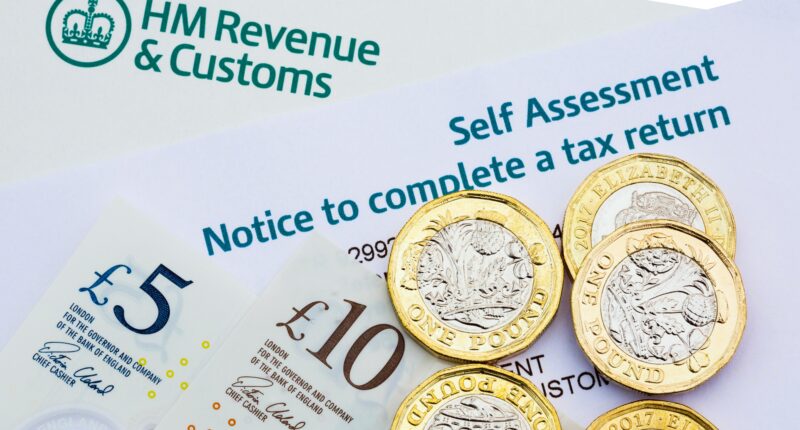HOUSEHOLDS will be racing to fill in their self-assessment tax returns before this month’s deadline.
Around 5.7 million people are still yet to fill in their tax return, with just weeks left before the January 31 deadline.
People who miss the self-assessment deadline face a penalty of £100 if their tax return is up to three months late.
Further fines of £10 a day are applied after three months, up to a maximum of £900.
For payments late by six months, you’ll be fined 5% of the tax you owe or £300, whichever is greater.
Myrtle Lloyd, HMRC’s director general for customer services, said: “There is less than one month for customers to submit their tax returns and my message to those yet to start is: don’t delay, do it online.”


Here is our guide to getting through your online self-assessment and avoid getting hit with a heft fine.
1. Be prepared
Self-assessment is a system HMRC uses to collect income tax.
Tax is usually deducted automatically from wages, pensions and savings, but people and businesses with other incomes must report it in a tax return.
This applies to the following:
Most read in Money
- Earned more than £2,500 from renting out property
- You or your partner received high income child benefits and either of you had an annual income of more than £50,000
- Received more than £2,500 in other untaxed income, for example from tips or commission
- Are self-employed sole traders
- Are limited company directors
- Are shareholders
- Are employees claiming expenses in excess of £2,500
- Have an annual income over £100,000
Before you can complete and submit your tax return, you’ll need to have a so-called unique taxpayer reference (UTR) and activation code from HMRC.
This can take a while to receive, so if it’s the first time you’re completing self-assessment, make sure you register online immediately and ask HMRC for advice.
To sign in or register visit the self Assessment tax return section of HMRC’s website.
If you’ve already signed up for self-assessment, you can find your UTR on relevant letters and emails from HMRC.
HMRC accepts your payment on the date you make it, not the date it reaches its account – including on weekends.
2. Gather all the information and documents you need
Gather all of the expenses and documents relating to your income.
Having these to hand will help you race through the process.
This includes your 10-digit Unique Taxpayer Reference (UTR) and your National Insurance number.
The form also includes include bank statements and details of untaxed income from the year, which might involve finding your P60 (if you earned more than £8,500), your P11D (which has information about expenses and benefits), and payslips.
If you’re self-employed, you’ll need records of your income and receipts for expenses.
You will also need interest statements from banks and building societies, and details of pension contributions made.
If you need third parties to provide you with statements and documents, you should contact them right away as this can take time.
3. Fill in the form
Once you log in to complete your online tax return, you should begin by checking your personal details.
You should then choose to fill in the sections that fit your circumstances.
With an online tax return, HMRC’s system will react to the answers you give as you put them in.
This might mean, for example, that sections that are not relevant to you are removed.
When filling in the figures, the online system gives reminders about where you can find the information to fill in particular sections.
As a self-assessment taxpayer you need to report everything you’ve earned over the tax year from April 6, 2021 to April 5, 2022.
This includes income from employment, self-employment, income from property, and interest and gains on your savings and investments.
Remember to also claim all the deductions you are entitled to, including gift aid on your charitable contributions and membership costs for zoos and museums.
If you are a member of a professional body that is required for your employment, you can include the cost of the subscription as a deduction.
Those who are self-employed can also claim back the running costs of a car, but not the cost of buying one.
Your tax will be calculated automatically as your fill in the return.
4. Take your time and double-check your return
Once you’ve filled in the empty fields, check all your numbers thoroughly before pressing submit.
When filing online, you can save your tax return at any time, so if you need to go away and double check your figures, do so.
When you are happy that everything is correct, you can press send.
If you need to change your tax return after you’ve filed it, you can do so within 12 months of the original deadline or you can write to HMRC for any changes after that.
5. Don’t be afraid to ask for help
If you need help with your return, visit the GOV.UK website or call the helpline on 0300 200 3310.
There are HMRC guidance notes and manuals online, but if you’re struggling you could seek advice from an accountant or tax adviser.
Consumer group Which? also offers an online self-assessment tool that does the calculations for a tax return and submits it directly to HMRC.
You have to fork out £10 for the service though, or £36 if you’re not a member.
6. If the tax bill is unexpected, check your tax code
If, when you submit your return, you find that the amount of tax due (or any refund of overpaid tax) is not what you expected, the reason may be an incorrect tax code.
If you suspect that the code is incorrect, call HMRC straight away.
This is the only way to rectify the mistake as the code won’t be amended automatically as a result of filing the return.
HMRC should issue a new code to you and your employer within a few days.
7. Pay your bill
Once you’ve submitted your tax return, you will be told how much tax and, if you’re self-employed, National Insurance Contributions (NICs) you will need to pay.
HMRC accepts your payment on the date you make it, not the date it reaches its account – including on weekends.
If you can’t afford your tax bill, you should still file your return, as the fines for late payment are lower than the fines for late filing.
You might also be able to avoid penalties and set up a payment plan to pay in instalments, but you should contact HMRC as soon as possible.
You can do so by calling the Business Payment Support Service on 0300 200 3835.
8. Don’t be late
Late filing fees are pretty steep, so make sure you get your self-assessment return in on time.
According to HMRC, you’ll get a £100 fine for failing to file your return a single day after the deadline.
Then, a £10 daily fine applies every day you don’t submit your tax return.
This is capped at 90 days – or £900.
So on top of the initial £100 fee, a £1,000 maximum late filing fine applies.
If you’re six months late, there’s a further £300 fine or 5% of the money you owe – whichever is higher.
That’s on top of the daily £10 charges built up so far, so there’s no shortcut to a smaller payment once you’re late.
And after 12 months, another £300 or 5% fine applies.
Interest is also added on top of this – and that went up last week, so late payers have even more to fork out now.


If you deliberately haven’t filed your tax return, a fine of up to 100% of the tax due could then be sent too.
Martin Lewis reminded employees to check their tax code to avoid being overcharged hundreds of pounds.
Do you have a money problem that needs sorting? Get in touch by emailing [email protected]









